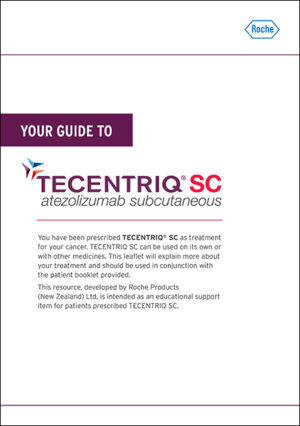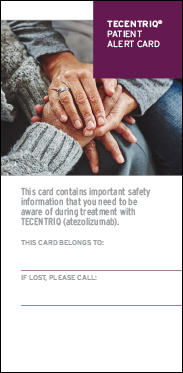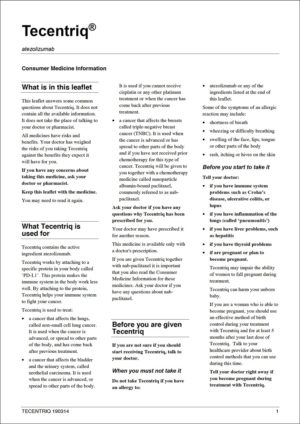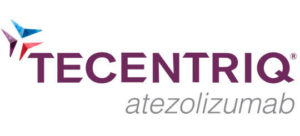Tecentriq®
(atezolizumab)
Pronounced Tee-sen-trick
Tecentriq, also known as atezolizumab, is a treatment for a type of cancer that affects the lungs called non-small cell lung cancer (NSCLC).
Tecentriq is used to treat:
- early NSCLC (lung cancer has not spread to other parts of the body)
- advanced or metastatic NSCLC (lung cancer has spread to other parts of the body)
- extensive-stage small cell lung cancer (ES-SCLC)
Tecentriq given by intravenous infusion is PHARMAC funded for patients with locally advanced or metastatic NSCLC that have previously received chemotherapy and meet defined criteria.
Tecentriq can be administered either by intravenous infusion or by subcutaneous injection. Talk to your doctor about which method of administration is right for you.
How Tecentriq works
Tecentriq is an immunotherapy that works by attaching to a specific protein in your body called ‘PD-L1’. Cancer cells with high levels of PD-L1 are hidden from your immune system. By attaching to PD-L1, Tecentriq makes your cancer visible again so your immune system can fight your cancer.
Registered indications
Non-small cell lung cancer
Tecentriq administered by either intravenous infusion or subcutaneous injection is registered by Medsafe for the treatment of NSCLC taken by itself (monotheraphy), as adjuvant treatment after surgery and chemotherapy, as initial treatment for patients who have high levels of PD-L1 in their tumour, or if the cancer is advanced or spread to other parts of the body and has come back after previous treatment with a different type of medicine.
Tecentriq can also be taken in combination with other medicines, such as Avastin (bevacizumab) and/or chemotherapy, when the cancer has spread to other parts of the body.

Small cell lung cancer
Small cell lung cancer (SCLC) makes up about 15-20% of lung cancers. It is a fast-growing cancer that forms in the tissues of the lungs and can rapidly spread to other parts of the body. Tecentriq is registered for the treatment of patients with ES-SCLC if no prior treatment for ES-SCLC has been received. In the initial phase of treatment, Tecentriq will be given with the chemotherapy medicines etoposide and carboplatin. This will be followed by Tecentriq given by itself.
Clinical Trial Data
The safety and efficacy of Tecentriq for the treatment of NSCLC and SCLC has been studied in numerous clinical trials.
Non-small cell lung cancer
Tecentriq, either taken by itself or in combination with other medicines, has shown to improve progression-free survival and overall survival in the following patient groups:
- Metastatic squamous and non-squamous NSCLC with high PD-L1 expression (Tecentriq monotherapy)
- Metastatic non-squamous NSCLC with positive PD-L1 expression (Tecentriq in combination with chemotherapy)
- Metastatic non-squamous NSCLC with liver metastases (Tecentriq, in combination with Avastin and chemotherapy)
- Metastatic non-squamous EGFRm or ALK+ NSCLC who have progressed on a targeted therapy (Tecentriq, in combination with Avastin and chemotherapy)
- Advanced or metastatic NSCLC following prior treatment with chemotherapy (Tecentriq monotherapy)
Tecentriq monotherapy has also shown to reduce the risk of disease recurrence or death in NSCLC patients with positive PD-L1 expression as an adjuvant treatment, following surgery and treatment with chemotherapy.
Small cell lung cancer
Tecentriq in combination with chemotherapy is the first major treatment advance for ES-SCLC in 20 years being the first immunotherapy combination to improve survival.
Keep in mind that everyone is different, and the response and benefit you may experience cannot be predicted. Ask your doctor about the clinical evidence for Tecentriq and if it is right for you.
Possible side effects of Tecentriq
Tecentriq is not the same as chemotherapy, however, as is the case with all medicines, treatment with Tecentriq can cause side effects.
You will find a list of known side effects in the Consumer Medicine Information here.
Talk to your doctor to see if Tecentriq intravenous infusion or subcutaneous injection is right for you, or if you have any questions or concerns.
How to access Tecentriq

Tecentriq given by intravenous infusion is PHARMAC funded for patients with locally advanced or metastatic NSCLC that have previously received chemotherapy and meet defined criteria. Tecentriq is not publicly funded by PHARMAC for other registered indications. This means you will have to pay for this medicine. Paying for treatment requires careful thought, but there are financial options and programmes that may help you fund private treatment.
The Tecentriq Cost Share Programme
• Caps the total amount you will pay for your medicine.
• Provides you with ongoing treatment at no cost once you reach the cap (other costs such as doctor fees and administration payments will still apply).
Patients usually pay for each cycle as they go, meaning they only pay for treatment while they benefit from it.
• Within the cost share programme there are 2 types of Tecentriq medicine available given in different ways, either intravenous infusion or subcutaneous injection. More information on these 2 options can be found here.
Your doctor will be able to give you more information regarding the cost of your treatment and the criteria for enrolling in the Tecentriq Cost Share Programme.
Ready to take the next step?
Because every situation is different, it’s important to speak to your doctor to find out if Tecentriq intravenous infusion or subcutaneous injection is right for you.
If you’re considering treatment with Tecentriq
We’ve put together a discussion guide to help you begin a conversation with your doctor. Print it off, take it along to your next appointment, and take notes in the spaces provided.
Talking to your doctor about Tecentriq
For further information about private treatment providers click here.
You can also talk to your current doctor about referral to a private doctor or treatment centre.
To learn more about how medicines become available in New Zealand, click here.
Handy resources

Tecentriq SC patient insert
This leaflet is for patients being administered Tecentriq by subcutaneous injection and should be used in conjunction with the Tecentriq patient resource.
DOWNLOAD
Tecentriq patient alert card
DOWNLOAD


